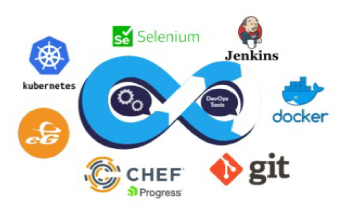
Benefits Of DevSecOps Automation
For Your BusinessIn recent years, DevSecOps automation has gained significant importance in the IT industry. It allows the organisation to automate the entire development, testing and deployment process efficiently and smoothly. In fact, many companies suggest that DevSecOps is an integral part of the software development lifecycle. Without automation in the DevSecOps pipeline, companies would face higher downtime and bugs in the system. As a result, many organisations have shifted to DevSecOps to streamline their software delivery process and optimise other activities.
Automation in DevSecOps has several benefits and thus many companies are switching over to DevSecOps culture to deliver new products or features to end users in a short period. In this article, we will cover how automation in DevSecOps can help to enhance the software development cycle.
This Article Contains








What is DevSecOps?
DevSecOps means merging software development(Dev) and IT Ops(operations) together. It is the practice to optimise the workflow by combining the development lifecycle and IT operational processes. DevSecOps can help to deliver and update product features quickly while maintaining the stability of the production environment. The ultimate aim of the DevSecOps pipeline is to shorten and optimise the process of development and CI/CD pipelines.
DevSecOps is an approach that enables responsiveness through rapid, quality delivery. DevSecOps practices can remove errors and increase communication by combining development and operations processes. The main philosophy of DevSecOps practises is enhancing the software delivery system by enabling fast changes to both code and infrastructure.
What is automation in DevSecOps?
Automation is the practice of using software tools to optimise iterative processes and reduce human errors in the software development lifecycle. Automation helps to simplify the DeOps practises and makes the process more efficient. It enables the development and operation teams to build, test and run codes in a short time with no errors. Automation helps organisations to build CI/CD pipelines to streamline their development lifecycle operations.
Importance of DevSecOps automation
Automation is the central aspect of DevSecOps practices. It enhances better collaboration and communication with team members by automating repetitive and routine tasks. It also enables shift left practices by streamlining the entire development process.
Benefits of automation in DevSecOps
Automation in DevSecOps practices allows various types of benefits to organisations which help them to achieve their DevSecOps objectives. Let us elaborate in detail on the benefits of automation in DevSecOps practices.
- Flexibility- Automating DevSecOps practices allows the organisation to configure and improve development processes even after pieces of the tech stack have been changed. Automation of DevSecOps practices provides greater efficiency and flexibility in terms of scope and functionality. In addition, automation of the DevSecOps pipeline is very cost-effective and faster.
- Consistency- Automation enables consistency and predictability. One of the main reasons why companies shift to DevSecOps automation is that an automated tool will always perform the same thing until it is reconfigured to do differently. Thus it reduces the scope of errors in the DevSecOps process.The same cannot be said for manual processes.
- Speed - One of the main advantages of automating DevSecOps operations is speed. Integration and application of code deployment can be done a lot faster with the help of automation. There are mainly two advantages: First, automation reduces dependencies on the manual workforce. An automated workflow can execute any process at any time of the day. Second, an automated tool can execute all processes much faster than any engineer. For instance, in the case of deployment of a new release, the engineer will take a lot of time to assess the various parameters before releasing. Whereas, an automated tool can perform all the tasks in a very short time.
- Scalability - Automated processes allow organisations to scale up their business quickly. It may not be possible for engineers to scale up this quickly. For instance, a team can deploy releases manually when dealing with a single application and one environment. But on the other hand, managing multiple applications and deploying to multiple environments can become very difficult to handle. Hence organisations are opting for the automation of DevSecOps practice to smoothly enhance the software delivery cycle.
- Cost Effective - Automation of DevSecOps operations can reduce costs associated with the DevSecOps team, as it reduces manual inputs in DevSecOps practices.
Examples of DevSecOps automation
Some examples of automation in DevSecOps are:
- Continuous monitoring - Automation allows continuous monitoring of the system. It helps to detect compliance issues and anomalies in the system. In addition, it can also track the unusual number of activities to detect security threats in the system.
- Infrastructure-as-Code - Infrastructure-as-Code allows organisations to configure codes based on configuration files made beforehand.
- Release Suites - It allows developers to build, package and publish new releases of software.
- CI/CD deployment automation - With the help of the CI/CD pipeline developers can build, test and deploy in a software environment without building the software manually.
- Data Backups - Automation helps in data backups without any kind of manual input.
Which Processes Should be Automated in DevSecOps?
Automation depends primarily on testing tools and configurations to automate the development life cycle process. Ultimately it depends on you and your organisation on what part of the DevSecOps process should you automate. Let us take a look at DevSecOps practices that you should automate. Given below are some of the processes of DevSecOps that can be made more efficient using automation. They are:
Planning
During the planning phase of an organisation to build a product/feature, DevSecOps teams chalk out plans for the whole process. It includes acquiring requirements, security policy, new release plans, feedback from stakeholders and customers and product road map and so on. Automation of the planning phase can help in simplifying the whole process. Some tools used for this phase are GitHub, Azure DevSecOps, iRise, Jira and so on.
Coding
Automation of the coding phase can help developers to use the source code repository to build, change and review codes. Some tools used in this phase are Bitbucket, Git, TFS, GitLab, Subversion, Cloud-force, etc.
Build
Automating the building process can help the developer teams to build full scripts that compile binaries and also generate web pages, documentation, and statistics.
Testing
Automation of testing to run on every build can check the functionality of codes. Although it cannot fix bugs, it can help to detect bugs quickly.
Deployment
DevSecOps automation tools allow the coordination and deployment of all resources across any dynamic environment. It provides a platform that keeps resources in sync as changes are implemented. Some best vendors of deployment management software are BMC Software, IBM and so on.
Monitoring
With the help of the automation of DevSecOps, monitoring application performance becomes very easy. It uses a dedicated interface to manage all the features of applications.
Log Management
Automation of log management involves getting logs, aggregating, reviewing, storing, analysing, inquiring, and archiving will help in troubleshooting and getting insight while implementing different measures in codes.
Infrastructure Management
The main aim of infrastructure automation is to automate the DevSecOps process and decrease human intervention to control all the hardware, network, software, operating systems, and storage components involved in delivering IT solutions.
Best Practices for DevSecOps Automation

1. Keeping software engineers in the loop - In a real-life scenario, it is impossible to automate the entire process of the DevSecOps pipeline. Automation in DevSecOps does not remove the engineers completely. In fact, the automated DevSecOps process also needs human supervision and intervention. 2. DevSecOps toolchain - Fragmentation in the DevSecOps toolchain can make the software delivery system very complicated. Unifying the fragments in the DeOps pipeline can help the developer team to manage the development process and software delivery system efficiency in real-time.
Final Takeaway
-
Automation is an integral part of DevSecOps practices. It allows software engineers to quickly and efficiently deploy applications/features in dynamic environments. Automation can help to reduce iterative tasks and human error. In addition, it helps developers become more efficient and productive in their respective fields. Hence, automation has become an important pillar in modernising the software delivery process.
-
A robust DevSecOps automation toolchain can ensure that your website and other DevSecOps processes are actually powering your customer experiences and making them more upgraded, reliable, and safe. Depending on your requirements you should pick the tools that can work at any scale in any kind of environment. Hopefully, we have been able to help you understand automation in DevSecOps practices and how the organisation can be benefited from it.
Let's discuss your project